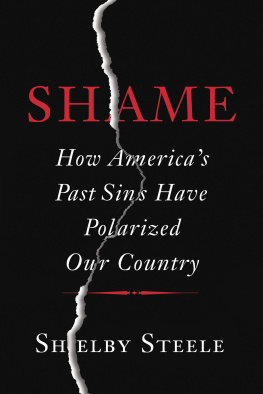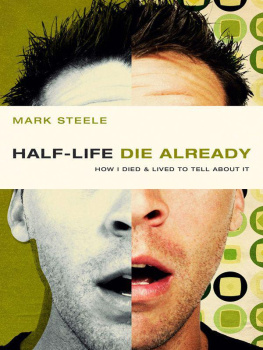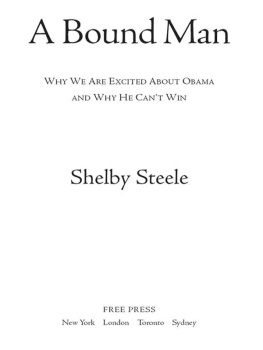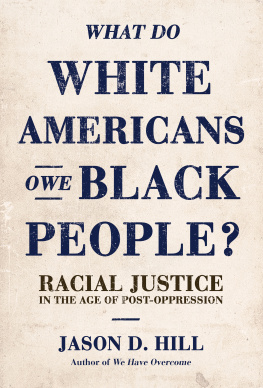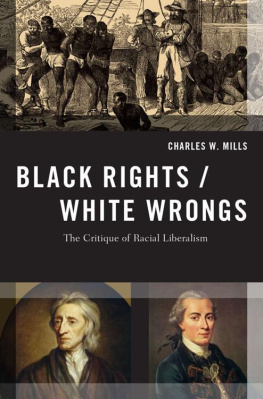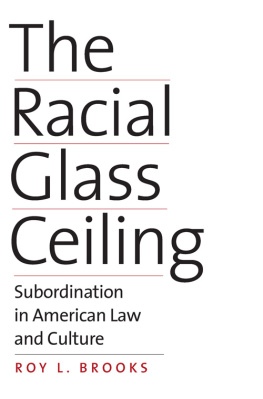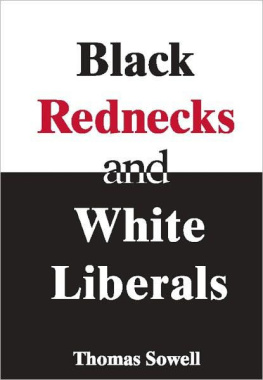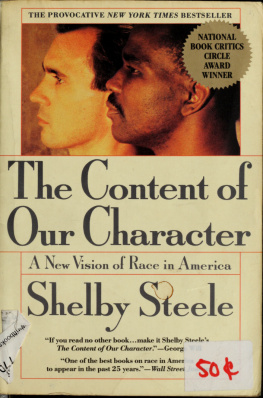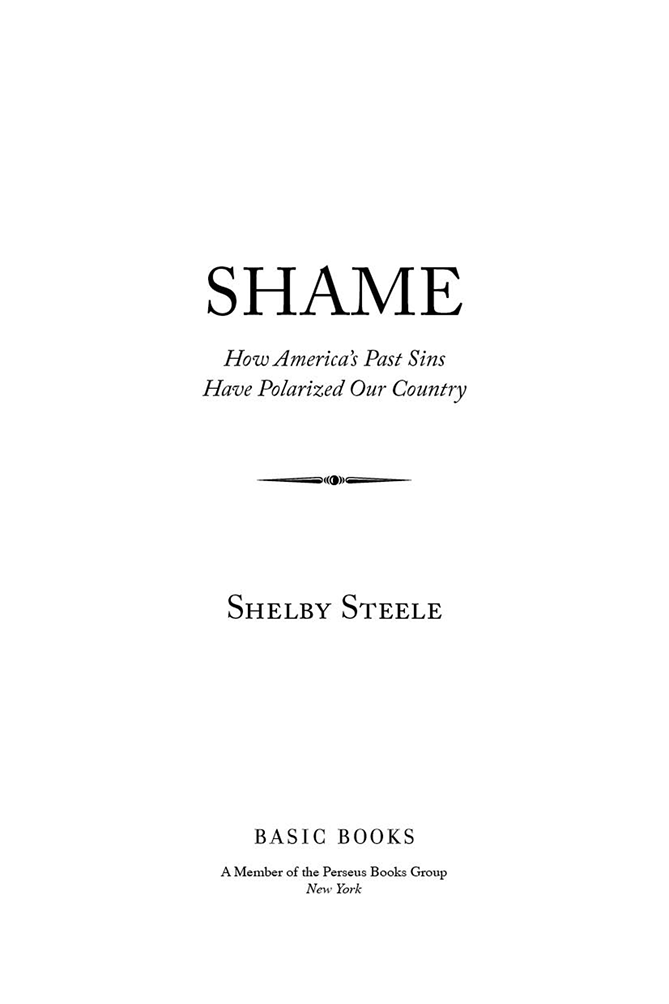SHAME
Copyright 2015 by Shelby Steele
Published by Basic Books,
A Member of the Perseus Books Group
All rights reserved. Printed in the United States of America. No part of this book may be reproduced in any manner whatsoever without written permission except in the case of brief quotations embodied in critical articles and reviews. For information, address Basic Books, 250 West 57th Street, New York, NY 10107.
Books published by Basic Books are available at special discounts for bulk purchases in the United States by corporations, institutions, and other organizations. For more information, please contact the Special Markets Department at the Perseus Books Group, 2300 Chestnut Street, Suite 200, Philadelphia, PA 19103, or call (800) 810-4145, ext. 5000, or e-mail .
Designed by Pauline Brown
Library of Congress Cataloging-in-Publication Data
Steele, Shelby.
Shame : how Americas past sins have polarized our country / Shelby Steele.
pages cm
Includes index.
ISBN 978-0-465-06697-1 (hardback) ISBN 978-0-465-04055-1 (e-book) 1. United StatesRace relations. 2. EqualityUnited States. 3. DiscriminationUnited States. 4. MinoritiesUnited States
Social conditions. 5. United StatesSocial policy. 6. United StatesPolitics and government. I. Title.
E184.A1.S767 2015
305.800973dc23
2014046421
10 9 8 7 6 5 4 3 2 1
I would like to dedicate this book to my wife, Rita Steele,
whose criticisms and labors have made it a better book.
Contents
N ot long ago I was the lone conservative at a panel discussion on race and politics at the famous Aspen Institute in Colorado. The day before the panel was to take place, some of us were askedas a way of opening what was to be a weeklong conferenceto say a few words about what we wanted most for America. This was surely a summons to grandiosity, but it did trigger a thought. When my turn came I said that what I wanted most for America was an end to white guilt, or at least an ebbing of this guilt into insignificance. I then used my allotted few minutes to define white guilt as the terror of being seen as racista terror that has caused whites to act guiltily toward minorities even when they feel no actual guilt. My point was that this terrorand the lust it has inspired in whites to show themselves innocent of racismhas spawned a new white paternalism toward minorities since the 1960s that, among other things, has damaged the black family more profoundly than segregation ever did.
I also pleaded especially for an end to the condescension of affirmative action, only to realize halfway through my remarks that the slightly slumping woman in the front row was none other than retired Supreme Court justice Sandra Day OConnorthe justice whose 2003 opinion in Grutter v. Michigan has effectively extended the life of affirmative action for another twenty-five years. But it was too late by then to take her feelings into account, so I finished on theme: the benevolent paternalism of white guilt, I said, had injured the self-esteem, if not the souls, of minorities in ways that the malevolent paternalism of white racism never had.
Post-1960s welfare policies, the proliferation of identity politics and group preferences, and all the grandiose social interventions of the War on Poverty and the Great Societyall this was meant to redeem the nation from its bigoted past, but paradoxically, it also invited minorities to make an identity and a politics out of grievance and inferiority. Its seductive whisper to them was that their collective grievance was their entitlement and that protest politics was the best way to cash in on that entitlementthis at the precise moment when America was at last beginning to free up minorities as individual citizens who could pursue their own happiness to the limits of their abilities. Thus, white guilt was a smothering and distracting kindness that enmeshed minorities more in the struggle for white redemption than in their own struggle to develop as individuals capable of competing with all others.
Of course, this was a mouthful, and something close to sacrilege at the liberal-leaning Aspen Institute. I had set out only to say what I truly meant, not to be provocative or to discomfit a retired Supreme Court justice. Yet I had been provocative all the same, and I may have also discomfited Justice OConnornot because I intended either outcome, but simply because I had offered up what was considered to be a conservative analysis of race in America.
The real provocation was in the very idea of looking at race in America through a lens of classic Jeffersonian liberalismthat liberalism which sought freedom for the individual above all else. This was the liberalism that had actually given us the civil rights movement of the 1950s and early 1960s. In that era, Martin Luther King Jr. was already recognizable as an American archetype precisely because he was so aligned with the central principle of this liberalism: individual freedom. I wanted to celebrate this liberalism and argue that a free societynot necessarily free of all bigotry, but certainly free of all illegal discriminationwas what America owed minorities. After that we minorities should simply be left alone. We should not be smothered, as we have been, by the new paternalistic liberalism that emerged in the mid-1960sa guilt-driven liberalism that has imposed itself through a series of ineffective and even destructive government programs and policies. We should be left to find our own way as free men and women in this fast-paced and highly competitive society.
In many ways the minority struggle for freedomjust like white Americas long-ago struggle for freedom from British rulehas been a battle to have no oppressive or capricious power intervene between the individual and his pursuit of happiness. How, then, does it constitute progress for minorities to overcome bigotry as a limit on their freedom only to subjugate themselves to a paternalistic interventionism inspired by white guilt? There is no true freedom either way.
This was the impropriety, the lapse of good manners that made for provocation. A freedom that could not guarantee a positive outcome for blacks (Americas classic victims) was perceived as unfair. So whether I was right or wrong was irrelevant next to the unseemliness of speaking about black Americans in the light of self-help and individual responsibilitytwo entirely conventional values that came to be labeled conservative only after the 1960s, and then primarily in relation to minorities.
I am used to being in situations where mention of such conservative values amounts to an impropriety. On todays political landscape, there are few people more inherently provocative, more unforeseen and unsettling, than people like myself who are designated black conservative. All the other permutations of racial and political identity are expectedwhite liberal or white conservative, Hispanic liberal or Hispanic conservative, black liberal. We know their cultural profiles: the Hispanic who is hard working, Catholic, and conservative; the upscale Connecticut white liberal; the black of almost any background who is presumed liberal simply for being black. Black conservatives confound expectation. Worse, we seem to put the moral authority that comes from our races great suffering into the service of an ideology (conservatism) that many see as a source of that suffering. By this logic, the black conservative can only be opportunistic or, worse, self-hating and sycophantic. So in a setting like the Aspen Institute, where liberalism is simple etiquette and where criticism of minorities is verboten, the black conservative inevitably gives offense.

